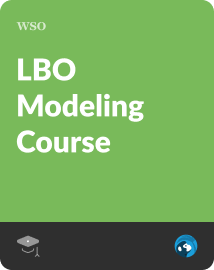LBO Terms and Definitions
Terms and Definitions used in the acquisition of a company, division, business, or collection of assets using debt to finance a large portion of the purchase price.
What are LBO Terms And Definitions?
A leveraged buyout is the acquisition of a company financed using debt for a high percentage of the transaction.
A leveraged buyout (LBO) is the acquisition of a company, division, business, or collection of assets using debt to finance a large portion of the purchase price.
The remaining portion of the purchase price is typically funded with an equity contribution by a financial sponsor or equivalent. LBOs are used by sponsors to acquire control of a broad range of businesses, including both public and private companies, as well as their divisions and subsidiaries.
This financing option is popular among private equity funds because it gives the management team more control over the company. Furthermore, the bank lending the money benefits from higher margins, thus creating a win-win situation for both parties.
LBOs are usually employed when the aim is to purchase totally or partially a company meanwhile putting down only a small investment when compared to the total acquisition price.
For example, the buyer might take over a company that is worth 1 $M while injecting only 40% of the total amount as his own investment.
Key Takeaways
- A leveraged buyout (LBO) is the acquisition of a company, division, business, or collection of assets using debt to finance a large portion of the purchase price.
- The target company must ensure loan repayment, which is considered the most difficult task in an LBO.
- The operation will be accomplished if the private equity firm reimburses the loan and purchases the minority owners' shares.
- Within the present scope, there are different debt types ranging from a revolver, with the lowest interest rate, to mezzanine debt, with the highest one.
- This article presents several distinct terms that are employed in the process of conducting a leveraged buyout (LBO).
Steps of a Leveraged Buyout
The first step of a leveraged buy-out is to form a holding company with capital that aligns with the amount the buyer is willing to inject and any other investments from Co-financiers.
The goal of the holding company is to acquire the intended company with debt and repay what is owed to the lenders from the profits successfully derived by the business.
A standard LBO can be segmented into three distinct stages:
The Loan
The loan will be an instrumental tool for the holding to acquire the desired company. Once this is done, the buyout is finalized.
Consequently, the company (private equity firm in most cases) that made the purchase exploited its assets as a borrowing power or capital leverage. These assets will also play the role of security or guarantee for banks that financed the buyout.
Repayment
The target company must ensure repayment of the loan, which is considered the most difficult task in an LBO. Therefore, a strategy should be implemented to guarantee that engendered profits cover the loan interests, a process known as positive leverage.
To fulfill its commitments, the holding company makes sure to be as liquid as possible by focusing on its operating activities or by selling non-core assets that are not essential to its operations.
This approach is called de-levering and requires an extended duration to achieve.
Holding Company-Target Company Merger
The operation will be accomplished if the private equity firm reimburses the loan and purchases the minority owners' shares.
A merger with the acquisition target would then occur to set up a single entity. Three motives can be mentioned for conducting an LBO:
- Convert a public company into a privately-held entity
- Separate a portion of a company in operation
- Transfer of control of a company
LBO Terms and Definitions
Below, you will find most of the terms and definitions used specifically in a leveraged buy-out scheme.
| Terms | Definitions |
|---|---|
| Capitalized Financing Fees | They are recognized as assets on the balance sheet since their fees have been paid in advance. These items will be expensed on the income statement with time, which will help reduce the tax provision. |
| Debt Comps | Debt Comps highlights equities, Duration, and Credit tranches of loans that businesses in the same sector apply. |
| Divestitures | One action could be when some departments of an enterprise are sold or the process of separating an existing entity from the others. |
| Floating | A “floating” interest rate is tied to LIBOR. For example, L + 100 means the loan's interest rate is whatever LIBOR is currently at, plus 100 basis points (1.0%). A fixed interest rate, on the other hand, would be 11%. It doesn’t “float” with LIBOR or any other rate. |
| Goodwill | Goodwill is an important accounting concept representing a business's intangible value beyond its identifiable assets and liabilities. Goodwill occurs when a company purchases another company at a price exceeding the fair value of its net assets. Essentially, goodwill represents the worth of a company's reputation, customer connections, brand awareness, and other elements that contribute to its capacity to generate future profits |
| High-Yield Debt | We can find three separate categories, and each one of them has a particular tenor, and seniority. Senior Notes, Subordinated Notes, and Mezzanine are considered high-yield debt. |
| Incurrence covenants | The company has to respect these criteria: a debt that does not exceed $2 billion, any revenue generated from the sale of assets must be employed to pay back debt, the business is constrained from acquisitions surpassing the amount of $200 million, and the money spent on CapEx is Limited to $100 million. |
| Industry Consolidation | Investing in or acquiring companies in the same field. Consequently, the buyer could combine the businesses and create synergies to reduce costs and expand his client database. |
| IRR | It is the rate at which the NPV of the CF is equivalent to 0. NPV: Net present value CF: cash flow |
| Legal & Advisory Fees | These are fees associated with the transaction. We deduct them from cash and retained earnings right away after the deal is concluded. |
| Maintenance covenants | Contractual conditions contained in loan agreements or debt instruments that the borrower must follow throughout the loan's tenure. |
| PE firms | Private equity firms. |
| Preferred Stock | Preferred stock frequently bears higher interest rates than other types of debt, resembling features commonly associated with mezzanine finance. |
| Revolver | Revolver has the lowest interest rates, tenor of 3-5 years. |
| Term Loan A | Has low interest rates tenor of 4-6 years. |
| Term Loan B | Has higher interest rates. tenor of 4-8 years. |
| Senior Notes | Has higher interest rates. tenor of 7-10 years. |
| Subordinated Notes | Has higher interest rates. tenor of 8-10 years. |
| Mezzanine | Has higher interest rates. tenor of 8-12 years. |

| Terms | Definitions |
|---|---|
| Sponsor Management Fees | The fees charged by the private equity company (also known as the sponsor) to the limited partners (LPs) of the private equity fund for the management and administration of the fund's investments are referred to as sponsor management fees. |
| Tax shield | This means that the interest a firm pays on debt is tax-deductible – so they save money on taxes and, therefore, increase their cash flow as a result of the debt from the LBO. |
| Tenor | is just a fancy word for “How many years will this loan be outstanding? What is its maturity period?” |
| Turnarounds | Taking struggling companies and improving their operations. |
| Up-front cash payment | By using debt, you reduce the up-front cash payment for the company, which boosts your returns. |




or Want to Sign up with your social account?